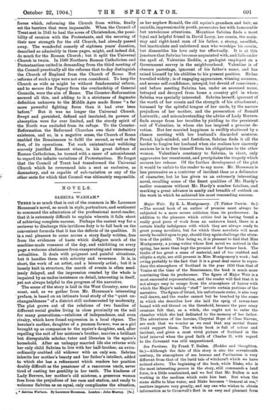THERE is so much that is out of the common
in Mr. Laurence Housman's novel, so much in style, portraiture, and sentiment to command the admiration of the professional novel-reader, that it is extremely difficult to explain wherein it falls short of achieving complete success. Perhaps the easiest way for a reviewer to discharge this invidious duty is to fall back on the convenient formula that it has the defects of its qualities. It is a real pleasure to come across a story finely written, free from the evidences of haste which disfigure much of the machine-made romance of the day, and exhibiting on every page a welcome abstinence from exasperating and unnecessary actualities. It deals with poignant and painful situations, but it handles them with sobriety and reverence. It is, in short, the work of an artist, and a leisurely artist ; but it is loosely knit in structure, the march of events is often need- lessly delayed, and the impression created by the whole is impaired by an undue insistence on detail, interesting in itself, yet not always helpful to the progress of the narrative.
The scene of the story is laid in the West Country, near the coast, and, as we gather from Mr. Housman's interesting preface, is based on an intimate local study of the "quiet un- changeableness " of a district still undesecrated by modernity. The plot grows out of the relations of two families of different social grades living in close proximity on the soil for many generations,—relations of independence, and even rivalry, which have found expression in a local rhyme. The heroine's mother, daughter of a yeoman farmer, was as a girl brought up as companion to the squire's daughter, and, after repelling the suit of her mistress's brother, marries a brilliant but disreputable scholar, tutor and librarian in the squire's household. After an unhappy married life she returns with her only child Sabrina to live with her half-brother, an extra- ordinarily crabbed old widower with an only son. Sabrina inherits her mother's beauty and her father's intellect, added to which she has a refinement which renders her position doubly difficult as the pensioner of a rancorous uncle, never tired of casting her gentility in her teeth. The kindness of Lady Berrers, her mother's old mistress, a generous woman free from the prejudices of her race and station, and ready to welcome Sabrina as an equal, only complicates the situation,
t' Sabrina Warham. By Laurence Housman. London : John Murray. [6s.] as her nephew Ronald, the old squire's grandson and heir, an amiable, impressionable youth, persecutes her with honourable but unwelcome attentions. Meantime Sabrina finds a most loyal and helpful friend in David Lorry, her cousin, the main- stay and right-hand man of his father, a strong, unselfish, but inarticulate and unlettered man who worships his cousin, but dissembles his love only too effectually. It is at this juncture that Sabrina becomes acquainted with, and falls under the spell of, Valentine Reddie, a geologist employed on a Government survey in the neighbourhood. Valentine is of obscure parentage, ignorant of his father's name, and has raised himself by his abilities to his present position. He has travelled widely ; is of engaging appearance, winning manners,_ and serene self-confidence; intrepid, but devoid of conscience and before meeting Sabrina has, under an assumed name,. betrayed and decoyed from home a country girl in whom. Sabrina was specially interested. Sabrina herself, ignorant of - the worth of her cousin and the strength of his attachment ; harassed by the spiteful tongue of her uncle, by the narrow prejudices of her mother, and the persecution of Ronald Lutworth ; and misunderstanding the advice of Lady Herrera, finds escape from her troubles by yielding to the persistent suit of Valentine, in whom she has inspired a genuine de- votion. But her married happiness is swiftly shattered by a chance meeting with her husband's discarded mistress. Proud, high-minded, and fastidious, Sabrina finds it all the harder to forgive her husband when she realises how sincerely anxious he is to free himself from his obligations to the other woman. Valentine's constancy to Sabrina, in short, only aggravates her resentment, and precipitates the tragedy which secures her release. Of the further development of the plot it would be unfair to the reader to say more. Mr. Housman is less persuasive as a contriver of incident than as a delineator of character, but he has given us an extremely interesting novel, recalling some of the finest qualities of Mr. Hardy's earlier romances without Mr. Hardy's sombre fatalism, and marking a great advance in sanity and breadth of outlook on the work in which he achieved his most resounding success.










































 Previous page
Previous page